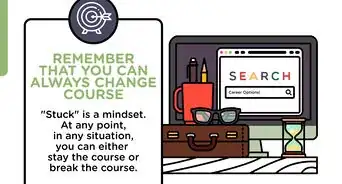This article was co-authored by Adrian Klaphaak, CPCC. Adrian Klaphaak is a career coach and founder of A Path That Fits, a mindfulness-based boutique career and life coaching company in the San Francisco Bay Area. He is also is an accredited Co-Active Professional Coach (CPCC). Klaphaak has used his training with the Coaches Training Institute, Hakomi Somatic Psychology and Internal Family Systems Therapy (IFS) to help thousands of people build successful careers and live more purposeful lives.
There are 10 references cited in this article, which can be found at the bottom of the page.
wikiHow marks an article as reader-approved once it receives enough positive feedback. In this case, 100% of readers who voted found the article helpful, earning it our reader-approved status.
This article has been viewed 145,508 times.
Whether your dream is learning to fly planes, or write the next great American novel, there are definite ways to fulfill these goals. You'll need to narrow down your focus, combat negative thinking, and keep your motivation up and running. See step 1 to get started fulfilling your dreams!
Steps
Laying the Groundwork
-
1Try new things. You may not know what your dreams are, or they might be vague and unsubstantial. That's okay! Trying out new things is a great way to find things that you love. It can help introduce you to people and ideas that will be important in fulfilling your dreams.
- Do things that you might not normally do. If your idea of a perfect afternoon is sitting at home reading a book, try going on a hike one afternoon instead, or take a cooking class. The more things that you try, the more likely you will find the things that really fire your interest.
- You can get a good idea about certain things if you take on a volunteering position in an organization you're interested in. Volunteering is a great way to get experience without too much expectation.
-
2Decide what’s important. It's hard to know how to achieve a dream if you're not entirely sure what it is you want to make happen. Think hard about what you love to do, what makes you passionate, what invigorates you. This is the time when you can be vague and unspecific. Think of it like brainstorming.[1]
- Consider what makes you feel fulfilled. Is it singing in front of an audience? Is it saving the whales? Is it imparting knowledge or reading massive piles of books? Is it researching folk music?
- Consider where you'd rather be when you're at work, or at school? If there were no obstacles or possibility of failure what is it you'd like to be doing?
- Create space to consider these ideas. While it's great to try things out with other people and ask others for their opinions on what you enjoy. Do things by yourself so you can fully experience things and decide for yourself if they fit into your ideas for your dreams.[2]
Advertisement -
3Narrow your focus. Once you have large and somewhat vague ideas about what you'd like to do, it's time to narrow your focus so you can actually achieve these dreams. The more specific you are, the easier it will be to set a timeline and goals to achieve your dream.[3]
- Remember that fulfilling your dream can come ways you may not expect. For example, if your dream is to make music, instead of playing at big venues, you turn your music making ability towards teaching underprivileged children or using it to ease people who are terminally ill.[4]
- You don't necessarily have to turn your dream into a job. You can do your dream on the side of your job (for example, doing volunteer work for an environmental conservation group).
- Your dream could be climbing the highest mountain on each continent, or running a 12k marathon. And, as always, you can have more than one. After all, most people don't just settle on one dream, but work towards fulfilling multiple dreams.
-
4Do your research. Once you have an idea, or more than one idea, of what dreams you want to accomplish, it's time to start looking into how to accomplish them. If you plunge into achieving your dream without researching the best ways to achieve it, then you're more likely to lose momentum and not succeed.
- Talk to someone who has achieved the type of thing you want to. For example, if climbing the highest mountain on every continent, you might read the autobiographies or journals of people who have climbed those mountains. You might even try to get in contact with some of them to see if they have any tips on how to make your success more likely.
- Look into what you'll need to do to achieve your dreams. If your dream is to run a 12k marathon, you'll need to look into what kind of training you need, and what sort of time you need to achieve. If your dream is to become an archaeologist, you'll need to look into what kind of requirements your specific area will require, how much schooling and what types of schooling.
- Don't be discouraged if it seems like your goal is going to entail a lot of hard work, and/or money. That doesn't mean that it isn't possible and if you get discouraged at the beginning, you'll never manage to achieve it. Most people don't achieve their goals because they sabotage themselves with worry about money or time.[5]
-
5Make goals. Once you have some idea what your dreams are going to require, you will need to make specific goals and time-frames that will help you keep on track. This doesn't mean that things won't change. You will still need to be flexible, but it will give you a good idea what kind of work, money, and time is going to be needed.
- Make a list of goals, both big and small: for example, if your goal was to be an archaeologist, your list of goals might be something like "write thesis, learn Greek and Latin, complete undergraduate degree in History and Archaeology, get into good graduate program, get PHd specifically focused on life in Roman small towns, go on an archaeological dig, acquire own dig, get job at a museum."
- Set a timeline. This timeline will have the big goals and the small goals. To use the above example, the small goals might be things like turning in important essays or writing your resume. The big goals would be things like graduating with your Bachelor's, or going on an archaeological dig to see if that's really what you want to do or if you actually want to be a historian or professor.
- It bears repeating, things will change. You will have to be flexible. You might end up underestimating the time it will take to achieve certain of your dreams, or you may realize halfway through that you actually want to do something else. That's okay! The goal is that you end up feeling fulfilled.
Developing a Positive Perspective
-
1Eliminate negativity. Negative thinking is one of the biggest obstacles towards achieving your goals. If you are constantly thinking that you don't have what it takes, that your dreams are too far away, then you aren't going to achieve them.[6]
- When negative thoughts enter your mind, acknowledge them and send them on their way. For example, if you think "I'm never going to achieve my goal to get published by thirty" acknowledge the thought and change it to "I'm working hard to get published by thirty, but if that doesn't happen, it doesn't mean I am a failure."
- Don’t compare yourself to others and whether they're achieving their dreams. There are always going to be people who are closer to fulfilling their dreams than you are. Respect them for the work they've put it and focus on putting work in on your own dreams.
- Eliminate people from your life who try to puncture your dreams. From early childhood children are told that they can't do this or that or the other. Ignore these voices of negativity. For example: if you wanted to go into space as a child, you can. It's hard work, but it is definitely possible if you put in hard work.
-
2Keep learning. The sharper you keep your mind the easier you will find it to overcome obstacles and achieve your dreams. Learning doesn't just have to be book-learning or school-learning. It can be cooking, fixing cars, or learning a new language.
- You can find free online classes for all kinds of subjects, including languages. Programs like Open University[7] provide free online classes for subjects ranging from Medieval studies to mathematics and sciences.
- Libraries, museums, and universities often have free, or minimal fee, lectures on all kinds of topics. Even if you don't know much about the subject, or haven't heard about it, try out a lecture. You may discover a new passion or a new dream.
- The sharper and healthier you keep your brain, the more likely you are to have the drive and the mental capacity to fulfill your dreams. People who keep learn tend to find it easier to find creative solutions to obstacles that may arise in their path.
-
3Learn from your mistakes. Instead of feeling like you've hit a dead-end when you make a mistake, examine what went wrong. Whenever some sort of "failure" happens, it's a chance to figure out what you might do the next time around. Mistakes are a good teacher and you will not be able to avoid them along the road.
- Take some space from the mistake before you start closely examining it. The knee jerk response to a mistake is to feel ashamed and want to cover it up or forget it happened. When you've given yourself time away from it, it makes it easier to go back over the mistake and see clearly what went wrong.
- For example: say you've been working really hard to become a published author. You've written a book, edited it over and over, had a few people look it over and give you suggestions. Then, after all that hard work, the publishing company rejected it. Look at your work. Was it right for that company? Was the cover letter or synopsis less than stellar? Is there area for improvement in your manuscript? Answering these questions with clear eyes is going to make your manuscript, and accompanying material better the next time around.
-
4Put in hard work. Dreams don't just fulfill themselves, unfortunately. You're going to have to put in work to accomplish the things that are important to you. This means practicing, it means putting yourself out there, it means taking mistakes and learning from them.
- Remember that people who appear to have gotten sudden good fortune usually have been putting in a lot of work behind the scenes. They've been networking with the people who can help them, they've been practicing their craft over and over, they've been making mistakes and trying things out. You don't see a lot of that, because the success ends up being what people notice.
- Don't begrudge the hours you spend working on your goal. However, if you're finding that you no longer enjoy what it is you're doing (there are always difficult aspects to any dream) then it may be time to check in with yourself. You may need to find a different dream.
-
5Ask for help. Nobody who achieved anything did it on their own. There were always people to help facilitate their ideas, or drive them to their soccer practice, or cheer on their efforts from the sidelines. When you're trying to achieve something important to you, ask for help.
- For example: when that manuscript got rejected you might go to someone whose opinion you trust and who you know will be honest with you. Don't be afraid to ask them to go over your manuscript and pick out the weak points. This will help you improve in your writing.
- Ask someone you admire (whether you know them or not) for tips on how they got to the place they're at. Most people who are closer to achieving their dreams have good advice for those still in the process.
Fulfilling Your Dreams
-
1Connect with others. People who fulfill their dreams tend to have a strong foundation. This means people who help you when you ask, people who encourage you, people who can act as your mentor, and so on. Without connecting with people you are far less likely to have the opportunities that come with community.
- Networking is a big way to make things happen. It can lead to a job, to your book being published, to discovering a new dream. Take advantage of opportunities to meet people in your chosen area. For example, if there's a journalist convention in town and your dream is to be a journalist, make sure you go to it and talk to people.[8]
- Look at every interaction as an opportunity. You have no idea where your next connection might come from. It might be that girl you met on the plane, it might be your boss at work. Talk to people, let them know what you're interested in, and make sure you return that interest by paying attention to who they are and what they do.
- Build community. This means that you have a strong support group, which makes it easier when you have setbacks while fulfilling your dreams. It means that while you are focusing on your dreams, you are also focusing on benefiting and connecting with other people on a personal level.
-
2Deal with obstacles. No one who has ever attempted to achieve their dreams has gotten a free ride. There are lots of obstacles that can crop up. Being prepared and being flexible can help you a lot when dealing with them.[9]
- One of the obstacles to fulfilling your dreams is the need to do everything perfectly. Perfectionism is going to make you unlikely to ever get started on your dreams. It's usually an excuse for procrastination. "I'll wait until I get my promotion..." "I'll wait until the kids are grown up..." "I can't start until I know exactly what I'm doing..."
- Another obstacle is fear. You're afraid to fail, you're afraid that you'll find out down the line that this isn't what you wanted after all, you're afraid other people will think your dreams are stupid. Letting go of fear is the same as letting go of control. You can't control how people think about you, you can't control how you're going to feel in a year, you have no idea what the future holds. When you find yourself obsessing over these fears, bring your mind back to the next task, without thinking about the overwhelming whole.
- Other obstacles may arise that you can't foresee. Ask yourself what do you need to overcome this obstacle? What happens if you don't? How did this obstacle come about? If there were no restrictions on solving this obstacle, what would you do? These questions can help unlock creative solutions to obstacles.
-
3Be realistic. This doesn't mean you have permission to be negative. Being negative and being realistic mean two very different things. Being negative means you don't think you can achieve your dreams. Being realistic means that you know it could take awhile and you know there will be obstacles along the way.
- For example: instead of quitting your job and running away to L.A. to be an actor right off the bat, try out acting classes and maybe acting school to see if that's what you really want to do. Work and save up some money so that you have a safety net for any potential problems ahead.
- Being realistic doesn't mean that you use obstacles or perfectionism as an excuse to procrastinate. This is where setting goals is so important. In the above example, the hypothetical person isn't saying "well, when I have more money..." they set a timeline "I'm going to make X amount of money and when I have that I'm moving to L.A. to look into acting opportunities. Until that time, I'm going to take classes in acting and working in local theaters.
-
4Stay motivated. Another problem that people have when trying to achieve their dreams, is staying motivated to do so. It's easy to get overwhelmed or distracted. Sometimes staying motivated means pushing through the times when things get hard.[10]
- Focus on the small steps. Avoid looking at the big picture, otherwise you're going to get overwhelmed. For the hypothetical person trying to become an archaeologist, there is going to be a lot of work and time to complete. Instead of focusing on the end goal (in ten years or so) focus on the next thing (that essay you have to finish, or graduating from college).
- Have a plan for staying motivated. it isn't necessarily a defeatist attitude to have plans for when your motivation flags. Along the way you're going to need a boost either because of a setback or simply exhaustion. Have a plan for those moments (taking a short break, reminding yourself what you're trying to accomplish, looking at what other people have accomplished!).
- Decide it this is what you really want. Sometimes when you're losing motivation for something, it's because you no longer have the same dreams that you once had. There's nothing wrong with this! It simply might be time to look in a new direction for fulfillment.
-
5Take risks. You won't fulfill your dreams by always taking the safe option. Dreams involve risk. They involve putting yourself out there in the world and hoping for the best. Hard work, planning, and being flexible can get you a good long ways, but for the rest, you have to know that you won't always succeed, but being willing to try anyway.
- Don’t wait to start accomplishing your dreams, even if you're starting small. There is no “opportune moment.” If you want to run that marathon, then start training right away.
Expert Q&A
Did you know you can get expert answers for this article?
Unlock expert answers by supporting wikiHow
-
QuestionHow can I start my dream?
 Adrian Klaphaak, CPCCAdrian Klaphaak is a career coach and founder of A Path That Fits, a mindfulness-based boutique career and life coaching company in the San Francisco Bay Area. He is also is an accredited Co-Active Professional Coach (CPCC). Klaphaak has used his training with the Coaches Training Institute, Hakomi Somatic Psychology and Internal Family Systems Therapy (IFS) to help thousands of people build successful careers and live more purposeful lives.
Adrian Klaphaak, CPCCAdrian Klaphaak is a career coach and founder of A Path That Fits, a mindfulness-based boutique career and life coaching company in the San Francisco Bay Area. He is also is an accredited Co-Active Professional Coach (CPCC). Klaphaak has used his training with the Coaches Training Institute, Hakomi Somatic Psychology and Internal Family Systems Therapy (IFS) to help thousands of people build successful careers and live more purposeful lives.
Career Coach Start exploring different options to find the path you want to follow. Once you discover what you care about, talk to people who are doing that kind of work. Interview them about their career and other careers in the same field. That way, you can discover what the actual work is like, as well as the path you might take to get there.
Start exploring different options to find the path you want to follow. Once you discover what you care about, talk to people who are doing that kind of work. Interview them about their career and other careers in the same field. That way, you can discover what the actual work is like, as well as the path you might take to get there. -
QuestionHow do you work hard to achieve your dreams?
 Adrian Klaphaak, CPCCAdrian Klaphaak is a career coach and founder of A Path That Fits, a mindfulness-based boutique career and life coaching company in the San Francisco Bay Area. He is also is an accredited Co-Active Professional Coach (CPCC). Klaphaak has used his training with the Coaches Training Institute, Hakomi Somatic Psychology and Internal Family Systems Therapy (IFS) to help thousands of people build successful careers and live more purposeful lives.
Adrian Klaphaak, CPCCAdrian Klaphaak is a career coach and founder of A Path That Fits, a mindfulness-based boutique career and life coaching company in the San Francisco Bay Area. He is also is an accredited Co-Active Professional Coach (CPCC). Klaphaak has used his training with the Coaches Training Institute, Hakomi Somatic Psychology and Internal Family Systems Therapy (IFS) to help thousands of people build successful careers and live more purposeful lives.
Career Coach
-
QuestionHow do you succeed?
 Adrian Klaphaak, CPCCAdrian Klaphaak is a career coach and founder of A Path That Fits, a mindfulness-based boutique career and life coaching company in the San Francisco Bay Area. He is also is an accredited Co-Active Professional Coach (CPCC). Klaphaak has used his training with the Coaches Training Institute, Hakomi Somatic Psychology and Internal Family Systems Therapy (IFS) to help thousands of people build successful careers and live more purposeful lives.
Adrian Klaphaak, CPCCAdrian Klaphaak is a career coach and founder of A Path That Fits, a mindfulness-based boutique career and life coaching company in the San Francisco Bay Area. He is also is an accredited Co-Active Professional Coach (CPCC). Klaphaak has used his training with the Coaches Training Institute, Hakomi Somatic Psychology and Internal Family Systems Therapy (IFS) to help thousands of people build successful careers and live more purposeful lives.
Career Coach
Warnings
- Slow down! Sometimes when you're winging your way towards a goal, what you really need to do is slow down before you burnout. Take each step as it comes and try to avoid rushing forward.⧼thumbs_response⧽
References
- ↑ http://tinybuddha.com/blog/3-steps-to-achieve-your-truest-dreams/
- ↑ http://www.psychologytoday.com/blog/finding-your-voice/201011/talent
- ↑ http://www.forbes.com/sites/panosmourdoukoutas/2012/02/11/the-six-rules-of-personal-success/
- ↑ http://www.nytimes.com/2011/07/04/nyregion/music-therapy-helps-the-dying.html?_r=0
- ↑ http://www.huffingtonpost.com/sura-flow/4-obstacles-to-fulfilling_b_4965119.html
- ↑ http://www.mayoclinic.org/healthy-living/stress-management/in-depth/positive-thinking/art-20043950?pg=2
- ↑ http://www.open.edu/openlearn/
- ↑ http://www.forbes.com/2007/05/04/networking-meeting-people-forbeslife-cx_sb_07networks_0504places.html
- ↑ http://tinybuddha.com/blog/get-started-on-your-dream-clear-the-5-most-daunting-hurdles/
About This Article
If you want to fulfill your dream, start by narrowing it down into a simple and specific goal so it’ll be easier to achieve. For example, if you dream of making music, make your goal more specific by aiming to play at a local coffee shop or taking music lessons. Additionally, talk to someone who's achieved the same type of goal to see if they have any tips or advice. Then, set a timeline for achieving your goal, but be flexible enough to adjust your timeline if things change instead of giving up. For tips on how to stay focused on your dream when you’re feeling discouraged, read on!













































































